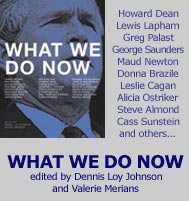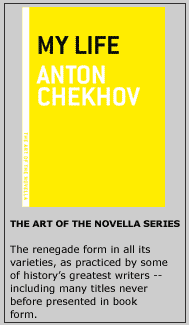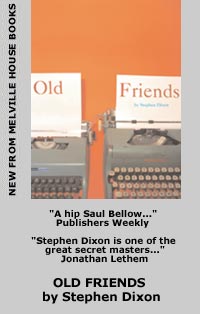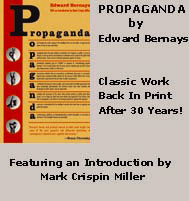

|
|
|

|
|
| WHAT'S SELLING WHERE | |
| A look at bestseller lists from the nation's best independent bookstores. This week's list is from the Olssons Books chain of 7 stores in the Washington, DC area. HARDCOVER FICTION 1. Prep Curtis Sittenfeld 2. Honeymoon James Patterson & Howard Roughan 3. Prince of Fire Daniel Silva 4. Kafka on the Shore Haruki Murakami 5. State of Fear Michael Crichton 6. Wind in the Willows Kenneth Grahame 7. The Broker John Grisham 8. Gilliad Marilyn Robinson 9. Girls in Pants: The Third Summer of the Sisterhood Ann Brashares 10. The Bad Beginnning Lemony Snicket 11. The Five People You Meet in Heaven Mitch Albom 12. The Sunday Philosophy Clu Alexander McCall Smith HARDCOVER NONFICTION 1. Blink: The Power of Thinking Without Thinking Malcolm Gladwell 2. French Women Don't Get Fat: The Secret of Eating for Pleasure Mireille Guiliano 3. Collapse: How Societies Choose to Fail or Succeed Jared Diamon 4. Sarah's Long Walk: How the Free Blacks of Boston and their Struggle for Equality Changed America Stephen & Paul Kendrick 5. The Road to Reality: A Complete Guide to the Laws of the Universe Roger Penrose 6. Too Soon Old, Too Late Smart: Thirty True Things to Learn Before You Die Gordon Livingston 7. The Daily Show with Jon Stewart Presents: America, A Citizen's Guide To Democracy Inaction Jon Stewart 8. Big Bang: The Origin of the Universe Simon Singh 9. Eats, Shoots & Leaves Lynne Truss 10. Parallel Worlds: The Science of Creation, Black Holes, Superstrings and Higher Dimensions Michio Kaku 11. He's Just Not That into You: The No–Excuses Truth to Understanding Guys Greg Behrendt & Liz Trucillo 12. Disneywar: The Battle for the Magic Kingdom James Stewart Olssons Books Previous column; HOW I MANAGED TO GALVANIZE THE RIGHT–WING HATE MACHINE WITHOUT REALLY TRYING . . . In a guest column, Steve Almond tells what happens when you write a simple little book about your love for candy and you maybe give just the slightest mention of your politics? |

|
||
|
Don't want to register for a site but need log on i.d.s and passwords? Get them at BugMeNot.com. MobyLives towers above all other literary weblogs. — The Complete Review Friday 11 March 2005 In Letters . . . A recent MobyLives correspondent writes in again to correct his own inaccurate charge of a fixed poetry contest . . . in the MobyLives letters section. Publishing Mein Kampf not the same as promoting its tenets, says Czech Supreme Court . . . "The Czech Supreme Court on Thursday overturned the conviction of a man who published a Czech language translation of Adolf Hitler's Mein Kampf, ruling he did not seek to propagate the book's racist ideas." A Reuters wire story says the publisher, Michal Zitko, was originally convicted in January 2004 and given a three year suspended sentence for promoting "a movement aimed at surpressing human rights." But in yesterday's decision the Supreme Court said "his actions were not an active attempt to support those who may believe in the book's contents." Wild book of Borneo may be banned . . . A book that has "become hugely popular in small, independent stores" and is the " talk of dinner parties" throughout Malaysia may be banned by the government because it speculates about how the son–in–law of the current prime minister might become head of the country himself. An Associated Press / Borneo Bulletin story says "Meanwhile, authorities are urging bookstores not to sell Khairy Jamaluddin: Future Prime Minister? written by veteran political author Yahaya Ismail." An anonymous government official says no final decision on the banning has been reached, but in the meantime, "it is advisable for bookstores not to sell it, since our enforcement teams might confiscate copies of the book because it's become controversial." Zang! . . . The comic strip Doonesbury this week featured an installment in which the long–running character based on Hunter S. Thompson, "Uncle Duke," learns of Thompson's suicide. As an Associated Press wire story reports, "the Thompson–like character, is seen checking his e-mail. He reads that Thompson is dead, and his head explodes with a 'Ka–Boom!'" Doonesbury creator Gary Trudeau deflected the questionable taste of the depiction by saying, "I've been exploding Duke's head as far back as 1985." Chinese bookstore should have been in the party district . . . Shanghai's first 24–hour bookstore has failed. According to a brief report in China's The Standard, the manager of the Shanghai Century Scholar Books says, "The store has been running at a deficit for a long time," while a customer says the store was just in the wrong neighborhood. "People who enjoy a good nightlife stay in Puxi," he explains. "So it's pointless and impractical to run an around–the–clock bookstore in Pudong." Oh ye of few words . . . The Boston Globe's Alex Beam identifies "a new microgenre" that he names "the omnididact's tale." "Perhaps because everyone feels so stupid," Beam explains in his column, " we witness the impulse to get smarter, preferably by reading one book." He cites A.J. Jacobs recent book about his year reading the Encyclopedia Britannica, as well as books by Bill Bryson and David Denby, but notes "I would never read any of these books, because I have no thirst for this showy breadth of knowledge. I aspire instead to know smaller things, and to know them well. I would like to understand the dark art of women's dress sizes why the Talbots 8 is everyone else's 10, for instance . . . " But referring to Joe Queenan's attack on Jacob's book in a now–famous New York Times review, in which Queenan called Jacobs a "jackass," Beam observes that Queenan has also applied the term to the Boston Globe critic Katherine Powers. Says Beam, "Sod off, Joe." Writer discovers another enjoyable way to not write . . . Writer Ian Daffern has found a way to cope, and maybe even revel, in the never–ending winter: Book–Lover's Trivial Pursuit. In a play–by–play for BookSlut, he describes his most recent battle of the literary brains: "I searched out the most rabid book–loving professionals I could find, those who eat plots for breakfast and dream ISBN numbers. I didn’t anticipate that when we divided up teams according to our respective factions of the publishing world, the trivial would become deadly serious. Booksellers, publishers, academics, and the dreaded media; who would claim the title as top book bad–ass?" Smart cops . . . The new mayor of a suburb of Mexico City "has ordered all 1,100 members of the municipal police to read at least one book a month or forfeit their chance of promotion." In a Guardian story by Jo Tuckman, Luis Sanchez, the mayor of Nezahualcoyotl, explains that, ""We believe reading will improve their vocabulary and their writing skills, help them express themselves, order their ideas and communicate with the public. Reading will make them better police officers and better people." Sanchez is providing reading lists and classes for officers with reading problems. Also, "there will be regular tests to verify that officers have read the books they name." Also, "Mr Sanchez said his officers would also be forced to get their cholesterol under control." NOTE: Daily newspapers often change URLs when archiving, so some links won't work beyond the day they're first posted. Thursday 10 March 2005 In Letters . . . The fix is in at other contests besides Iowa, says one MobyLives reader . . . in the MobyLives letters section. Blonde on . . . blonde? . . . A Rueters wire story reports that Tina Brown has signed a major deal with Random House to write a book about Princess Diana. The story says "Random House spokeswoman Suzanne Herz declined to comment on reports the deal was worth $2 million, but said the book would be published in 2007 to coincide with the 10th anniversary of the princess's death in a car crash in Paris." Killer review . . . Officials at Amazon.cm swiftly pulled a customer review yesterday posted by a convicted murderer from his jail cell. A report from New York's CBS TV affiliate says Danny Pelosi, convicted last year fo killing millionaire investment banker Ted Ammon, phoned his girl friend and dictated a three star review of Almost Paradise: The East Hampton Murder of Ted Ammon, by Kieran Crowley. "I have been following this case and have personal interest in it," said Pelosi's review, going on to complain about the "many things in the book that aren't factual," including the part about him killing Ammon. Amazon spokeswoman Patty Smith says the review was pulled because, "It's not a soap box — we ask reviewers to talk about the book." Resistance is futile . . . America's second–biggest bookselling chain, Borders, is opening a store in Kuala Lumpur next month, and plans to follow up with nine more stores in Malaysia, says an Associated Press wire story. Previously, in addition to its 460 Borders stores and 700 Waldenbooks outlets in the U.S., most of the company's foreign stores were in the UK, where it has 41 stores. It expects to open the Malaysian stores by 2010. Meanwhile, back in Dumbfuckistan . . . A radio program where books and periodicals are read aloud to the blind has been first cancelled, then given back a limited schedule by a Buffalo, NY broadcaster after one listener complained that a late night reading of Tom Wolfe's I Am Charlotte Simmons including an obscenity. As Anthony Violanti details in a Buffalo News report, the Niagara Frontier Radio Reading Service for the Blind had been carried as a "secondary audio feed" in Buffalo by TV station WKBW Channel 7 for 14 years. But after the solitary complaint the station dropped the program, then brought it back but with programming between 10 pm and 5 am—when adult books were typically read—cancelled. "We've been doing this with Channel 7 for 14 years and never had a problem," says Robert Sikorski, NFRRSB president. Officials at the station cite the "post–Janet Jackson Super Bowl clampdown on indecency by the Federal Communications Commission." But Ronald Collins, a scholar from the First Amendment Center, says, "It's another example that we live in a time when broadcasters are becoming hypersensitive in a way that threatens free speech in America." Meanwhile, in a commentary on his Some Old Guy blog, Phil Sheehan notes that he has read for similar reading services for the blind, which regularly included adult material, with no problem. Plus, he's worked at the very station in question, WKBW, which he says started out as an "outlet for the theological fulminations of Doctor Clinton Churchill. The letters W–K–B–W, according to station history, stood for Well Known Bible Witness. . . . Now, apparently, it has come full circle, back to the stern and sanctifying moral uprighteousness of its founder." Bukowski: dead and outside the mainstream, and selling like never before . . . His former publisher, John Martin of Black Sparrow Press, has said of Charles Bukowski that "he is not a mainstream author and he will never have a mainstream public.² And yet, as Adam Kirsch says in a New Yorker profile of the late author, "This is an odd thing to say about a poet who has sold millions of books and has been translated into more than a dozen languages." What's more, says Kirsch, "it is on the Internet that the Bukowski cult finds its most florid expression. There are hundreds of Web sites devoted to him, not just in America but in Germany, Spain, the Czech Republic, and Sweden." So who are those fans? As Bukowski himself told one interviewer before his death in 1994, "I get many letters in the mail about my writing, and they say: ŒBukowski, you are so fucked up and you still survive. I decided not to kill myself.¹ . . . So in a way I save people. . . . Not that I want to save them: I have no desire to save anybody. . . . So these are my readers, you see? They buy my books—the defeated, the demented and the damned—and I am proud of it.² Deadly reading . . . "Once upon a time, all an author had to do was write the book," notes The Hartford Courant's book editor Carole Goldberg. "Publishing houses now expect authors to play an up–close–and–personal role in promoting their books. And that means getting on the road to make appearances at bookstores, libraries, writers conferences, schools and other venues to read from, talk about and sign copies." But in an in–depth feature, Goldberg finds that "there's just no predicting what might happen when author meets audience" when 14 different respond to her request for "some of the unusual things that have happened to them during these close encounters of the literary kind." In addition to the stories from Maureen Howard, Stewart O'Nan, Amy Bloom, Steve Almond and others, there's the one from Catherine Gildiner, who carefully details how at her first reading an audience member actually died—and she insisted on finishing the reading anyway. NOTE: Daily newspapers often change URLs when archiving, so some links won't work beyond the day they're first posted. Wednesday 9 March 2005 Another AMS exec charged with fraud by Feds . . . The Federal government is filing fraud charges against a former executive of the country's leading independent book distributor, Advanced Marketing Services Inc. (AMS), "for alleged fraudulent schemes to inflate AMS¹ financial results." According to a report in the San Diego Business Journal by Mike Allen, after the U.S. Attorney's Office and the Securities and Exchange Commission filed charges, a Federal grand jury in San Diego has filed a 33–count indictment against Sandra Miller Christie, "a former vice president of advertising for AMS, for her alleged role in defrauding AMS customers out of advertising funds that were later used to prop up AMS earnings over its 2001 to 2003 fiscal years." Last September, another AMS executive, Marcy Wilson Roke, pleaded guilty to related charges. Burnham jumps to HarperCollins; end seen for Miramax . . . While parent company Miramax founders Harvey and Bob Weinstein negotiate a break–away from its parent company, Disney, the publisher being "viewed as an orphan in the acrimonious talks among the moguls" has just lost its founding editor–in–chief Jonathan Burnham. As a New York Post report notes, Burnham "will be head of the Harper imprint of the general books group of HarperCollins, reporting to Michael Morrison, president and group publisher of Harper Morrow division of the general books group." As for what's to become of Miramax Books, "the end is near," says the Post. "It is expected that the Miramax book unit, including its unpublished authors, will be absorbed into Disney's larger Hyperion publishing group when the final bust–up is finally unveiled — possibly as early as this week." Call for Churchill to resign in continuing turmoil at CU . . . In the wake of yesterday's resignation by University of Colorado president Elizabeth Hoffman, The Denver Post has called for the resignation of Ward Churchill. In a ringing editorial, the paper's editors say, "He's done enough damage to the university. Having to defend academic freedom in the context of Churchill's writings and rants was surely one chore that CU President Elizabeth Hoffman didn't need." The paper continues, "Churchill is an absurd character who relies on First Amendment freedoms to defend his teaching position, while denying others the right to take part in a Columbus Day parade. He's turned stomachs across the country with his likening of Sept. 11 victims to 'little Eichmanns' and with his 'right on!' response to the 2001 attacks. If he's lucky enough to not be fired, Churchill should quit for the good of CU. Of course he may find a hard time landing at another school — after all, he's more of a political figure than a scholar. He's better off linking up with a political movement or a think tank interested in his views." Sharpe announcement a surprise—and a mystery . . . One of Canada's most respected publishers, Martha Sharpe, has "abruptly resigned" from the House of Anansi, the "historic publishing house . . . founded in the '60s by writers with avant–garde sensibilities" and that "inspired a small–press movement in Canada." Sharpe had been the company's "guiding spirit since being made publisher at the age of 29" seven years ago, notes a Toronto Star report by Judy Stoffman. Sharpe tells the paper, "I wanted the publishing side of the business to rise to the level of the authors. I still have this idea of doing things differently from other publishers." Owner Scott Griffin tells Stoffman he is "saddened and surprised": "She is very talented, but people get restless and want to move on. No house depends on only one person. We will go on." Impac finalists announcecd quickly before Foetry finds out . . . The nominees for the world's most lucrative literary prize, the Impac Award, have been announced. As a BBC News wire story reports, the nominees are Edward P. Jones, Damon Galgut, Shirley Hazzard, Jonathan Lethem, Arnon Grunberg, Christoph Hein, Frances Itani, Douglas Glover, Lars Saabye Christensen, and Diane Awerbuck. The Impac is a 100,000 euro prize for books from any country that have been written in or translated into English. Last year, the prize went to Moroccan novelist Tahar Ben Jelloun. And that was for Miami Vice . . . Although it was supposed to be closed to the press, the star–studded memorial held at the swank Hotel Jerome in Aspen for Hunter S. Thompson was attended by a Denver Rocky Mountain News reporter who has now gotten the okay from the family to write about the affair. In a lengthy report, Jeff Kass details testimonials from "Johnny Depp, John Cusack, Bill Murray, Jack Nicholson, Don Johnson, Sean Penn, Rolling Stone founder Jann Wenner, Pulitzer–Prize winning author William Kennedy and more than a dozen others." Don Johnson, for example, a neighbor of Thompson's, says he once asked Thompson what was the sound of one hand clapping, and Thompson promptly slapped him across the face. NOTE: Daily newspapers often change URLs when archiving, so some links won't work beyond the day they're first posted. Tuesday 8 March 2005 In Letters . . . Foetry.com, the University of Iowa writing contests, and Little Black Sambo remain the hot topics . . . in the MobyLives letters section. High school student arrested for either terrorist manifesto, or bad short story . . . A high school junior in Winchester, Kentucky has been "arrested, jailed and charged with a felony" for "making terrorist threats in writings found at his home," say police, while the student maintains what they found was a short story about "zombies." As a report by Campbell Roth for the Student Press Law Center details, the student, William Poole, 18, was arrested after his grandparents found the writing and called police, apparently out of fear that the work threatened violence at Poole's high school, George Rogers Clark High School. Poole says, "It's a fake story. I made it up. I've been working on one of my short stories, [and] the story they found was about zombies. Yes, it did say a high school. It was about a high school overran b zombies." But the principal of Poole's high school, Atkins, says, "It did not mention [Clark High School or school officials] specifically but it did mention 'the high school,' and how many teachers were there and how long it would take the police to arrive once they received an emergency call." Meanwhile, an earlier report in the Winchester Sun by Tim Weldon says police alleged that Poole's writing was an attempt "to convince other students to participate in an armed takeover." Poole, arrested on 22 February, is still being held at the Clark County detention center. CU president resigns in wake of Churchill scandal . . . In the wake of the controversy over the writings of Professor Ward Churchill, who compared 9/11 victims to Nazis, Betsy Hoffman, the president of the University of Colorado, has resigned. As a Denver Post story notes, the CU campus was already embroiled in an ongoing controversy regarding football team recruitment when the Churchill story broke. But the Churchill controversy has gotten even more intense attention nationwide, and within the state the governor and the state legislature have called for Churchill's removal, while others—including the Denver Post itself—have called for Hoffman's removal in the wake of the scandal. The Post story says Hoffman says "her decision was based solely on a belief that announcing her resignation would help relieve some pressure on the university." Seen at the revolving door . . . HarperCollins publisher Susan Weinberg will be leaving her post, effective at the end of the month, according to report on The Book Standard by Rachel Deahl. Michael Morrison, the head of Harper Morrow, will assume the role until a replacement can be found. He praised Weinberg in a letter released Monday, saying the 11–year veteran was a "dedicated publisher." Weinberg was appointed publisher of the HarperCollins imprint in 2003. Honey! The new generation of geniuses are here! . . . In Israel, the long–time editors of two of the country's leading literary–review supplements to mass–circulation dailies have left and both publications are undergoing "significant changes" in the aftermath, according to a report by Shiri Lev–Ari in Haaretz. The dailies in question, writes Lev–Ari, are Yedioth Ahronoth and Maariv, which "together with the literary supplements of Haaretz . . . are to a large extent responsible for shaping literary criticism in Israel." So what kind of changes can be expected? At Yedioth Ahronoth, new editor Shulamit Gilboa says she wants "more space given to intellectuals to whom the press and the television don't give much space, so they can write their opinions of politics and current events or about some literary problem." At Maarive, meanwhile, new editor Dana Elazar–Halevi says, "My sense is that until now the literary supplements presented an old–fashioned worldview. They were a quiet place and cut off from what is happening. . . . In my opinion, publishing a review of a book that can barely be found in the shops is an anti–journalistic act." Don't we have enough characters? . . . Random House announced that Senator John McCain and co–writer Mark Salter will author a book for children and young adults titled "Character Is Destiny: True Stories Every Young Person Should Know and Every Young Adult Should Remember." A story in The Arizona Republic by Billy House reports that the book will be published in October, and the authors consider it "a book for parents to share with their children." Hague happy to be only Conservative author not in hoosegow . . . As leader of England's Conservative Party, William Hague was the "second–most–important" politician in the country. But when he had to resign after the sweep to power by Tony Blair and the Labor Party, Hague found himself out of work at age 40. What to do? Write a book, of course. As Mark Feeney details in a Boston Globe profile, Hague has published a biography of one of Britain's most famous prime ministers in William Pitt the Younger. Just out in the U.S., it's already a success in Britain. At an appearance at a downtown Boston Borders, Hague tells Feeney, "Talking about one's book is like an election without an opponent. Everyone's nice to you. Most unusual feeling for a politician." He says he hopes to go on to write a "prequel"—a life of William Pitt the Elder. Says Hague, "If I'd known things would be like this, I'd probably have resigned sooner." And she's starting by outwitting blog world nit wits . . . "Poets must remember their calling and take stage again!" says Camille Paglia in a new book, Break Blow Burn, which receives skeptical treatment in an item on The Drudge Report. Drudge says "authorprofessorcritic" Paglia "boldly declares" that "In our voracious 24–hour news cycles, we're rafting down the roaring river of media. It's exciting and exhilarating, but it's good to remember that SOME things last—and they're in art!" Drudge notes that Paglia has assembled poetry by John Donne, William Blake, Walt Whitman, William Butler Yeats and others, but that "The ENTIRE poetry establishment, all the honored, famous, adulated major living poets are excluded from the book!" Paglia, he says, "is once again hoping to outsmart lit world big wigs." NOTE: Daily newspapers often change URLs when archiving, so some links won't work beyond the day they're first posted. Monday 7 March 2005 In Letters: Fie, Fi, Fo, Foetry . . . More reader mail about Foetry.com, the University of Iowa writing contests, and also about Little Black Sambo . . . in the MobyLives letters section. Dr. Thompson send–off begins . . . Sean Penn, Jack Nicholson, Johnny Depp, John Cusack, and George McGovern were all in Aspen, Colorado Saturday to attend a private memorial party for Dr. Hunter S. Thompson. "The guest list of artists and illustrators, writers and photographers, actors and filmmakers was intended to include only Thompson's closest friends. A public memorial is in the works," says a Denver Post report by Chuck Plunkett and Chris Frates. The Post report says the party was originally supposed to be a small affair at director Bob Rafelson's ranch, but a large response forced the family to move the event to a larger venue, the Hotel Jerome, where guests were asked "to bring a favorite photo or memento to help mark the occasion." An Associated Press wire story by Catherine Tsai says "Inside, the hotel's ballroom was decorated with a giant American flag and an almost life–size black and white photo cutout of Thompson standing in front of it . . . A sign outside the doorway said 'Thompson for Sheriff,' a reference to Thompson's almost–successful 1970 bid." Thompson campaign headquarters for that bid was the hotel's bar. Random Condo . . . "For a house that made its name publishing James Joyce and, more recently, E.L. Doctorow and Norman Mailer, Random House has had an unusual last year. Its two best-known, best-selling authors in 2004 were Donald Trump and American Idol's Clay Aiken," observes Matthew Flamm in an article for Crain's. As he goes on to say more bluntly, "The flagship imprint of the world's largest publishing company is suffering an identity crisis. Staff turnover and a difficult marketplace for literary books are pushing Random House away from its highbrow heritage and toward the lowbrow commercialism that marks most of its competitors. And at the same time that it's shedding its literary distinctiveness, it has yet to enlist the sort of blockbuster author, such as John Grisham, who can be relied on to keep a commercial publisher in the black." And their parents were happy they were hanging out at the library so much . . . Four college students have been indicted on charges of stealing a first edition of Charles Darwin's Origin of the Species and sketches by John James Audobon from the library of Kentucky's Transylvania University, according to a brief Associated Press wire story. The report says they were caught after trying to sell the items to Christie's auction house in New York City. The men are not named, but one is said to be a Transylvania student, while the others were current or former students at the University of Kentucky. America catching up to Europe with new flood of 9/11 novels . . . "After three years of near silence about the attacks of Sept. 11, the literary world has begun to grapple with the meanings and consequences of the worst terrorist attack ever to happen on American soil," reports Ed Wyatt in a New York Times story. Wyatt talks about "a half–dozen novels that use 9/11 and its aftermath as central elements of their plot or setting, from some of the most acclaimed literary novelists and the most respected publishing houses," which are "being released later this year." Included are books by Lynn Sharon Schwartz, Jonathan Safran Foer, Reynolds Price, and Ian McEwan, whose book is already out in the UK. Wyatt also cites Frederic Beigbeder's Windows on the World, which was actually released in France nearly two years ago. "The delay of more than three years reflects both the logistics of producing a bound volume of a lengthy manuscript and the more subtle, complex process of creating a novel," says Wyatt. Hey Moe — the culture's not as stupid as we thought! . . . Some recent World–Book–Day fulminating that "writing culture has overtaken reading culture" has prompted a response from Robert McCrum in his most recent Observer column. He lumps the notion that "The fantasy of writing a book has supplanted the pleasure of reading one" in with other recent book business worrying. "Too many books are being published, it argued; we are drowning in a fetid froth of trash. Reading has become merely chic entertainment. Writers are no longer to be looked up to. There are no more classics." McCrum's response: "The barbarians are not at the gate. It's an age of awesome variety we are living in. English in all its thrilling, international forms, from romance to rap, is finding more colour and expression than at any time since Spenser, Marlowe and Jonson." • RELATED . . . In a case in point to what McCrum writes about, HarperPress publisher Carolin Michel, in a speech given on World Book Day and reprinted in The Guardian, notes that "a Dickensian mix of wild optimism and gloomy despair do seem to characterise much of what is written and said about publishing nowadays." Curator's dream . . . "All curators dream of that great discovery — the scroll in the cave which tells us something new about Jesus, the flash of silver from dark–age silt, the old master long overlooked in the cool dark corner of a Tuscan church," notes Christopher Flectcher, a curator at the British Library. Some of the "great manuscript turn-ups of the past," he says, include "Coleridge's 'Kubla Khan', unearthed from a private collection by scholars in 1934 . . . the 15th–century Book of Margery Kempe, the earliest autobiography in the language, stumbled upon in the same year and almost thrown out by an old buffer searching for ping–pong balls; Thomas Traherne's meditative Commentaries of Heaven, written around 1674 and plucked from a Lancashire rubbish tip in 1967." In an essay for The Independent, Fletcher talks about his own find, "the holy grail of the literary Forties: Tambimuttu's long–lost archive." As he explains, Meary James Thurairajah Tambimuttu "claimed descendant of the Kings of Jaffna and future King of bohemian London, steamed into England from Ceylon in January 1938, aged 22," with the stated goal of becoming "the West's foremost publisher of poetry." He went on to work with T.S. Eliot, Stephen Spender, Dylan Thomas, Stevie Smith, Edith Sitwell, and others, and leave "an indelible, colourful mark on British literary culture." NOTE: Daily newspapers often change URLs when archiving, so some links won't work beyond the day they're first posted. |
||

AVAILABLE NOW!
This week's fiction:
Zembla: The Official Site of the Vladimir Nabokov Society
Everyone Who's Anyone in Adult Trade Publishing
Author interviews at IdentityTheory.com



RECENTLY
UNDER–APPRECIATED
From Ig Publishing . . .



The International Bestseller
WHO KILLED DANIEL PEARL?
by Bernard–Henri Lévy
WHALE SIGHTINGS
"Crank Call"
by Thomas J. Hubschman
(from Me Three)
"Brain Spiders"
by MISSY WILKINSON
(from Prose aX)
This week's poetry:
"Not Pee Wee"
by NICK THRAN
(from Grain)
"Airport"
by ELIZABETH VOLPE
(from Briar Cliff Review)
Special edition:
POEMS FOR THE TIME
First posted in October, 2001, Alicia Ostriker's anthology of poetry that she turned to after the 9/11 attacks — including the work of Stephen Dunn, C.P. Cavafy, Marianne Moore, and others — is far and away the most popular link ever posted on MobyLives. Find out why.

Links